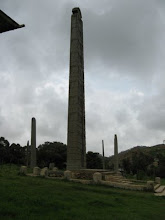
Interesting interview. But it will be useful to always provide a time frame for such interviews so that one can put it in context. Warren is someone I respect and admire. What was not said in the interview is that he keeps 10% of his earnings from the book and give away 90% because he just does not want wealth and power to control him or intoxicate him. Journalist investigated and verified this.
The lesson here is for some in this forum attending some churches in Nigeria to draw ethical lessons here and use it to interrogate the social ethics of your ministers. With all the Christianity spreading in Africa, you find too much talk about wealth or signs and wonders. Warren will not see sign and wonders in the sense of the healing of his wife but he remains faithful. He has not allowed wealth to be the measure of God working in his life as is the case with some of the ministers in Nigeria who are overly concerned about structures and buying private jets. There is so much distortion of the Bible. For them, wealth is an indication of God working. They do things in excess but they give it a different packaging. Yet, pagan philosophers like Plato have discussed the importance of temperance as a virtue since BC period. In Christianity, some people call it contentment or moderation. Not that you should not live a good life, but what is the role of moderation?
If Jesus had the power to do everything to glorify himself, why did he walk as an ordinary peasant across Galilee? He lived like ordinary people. There is a whole problem with the way many Christians are reading the Bible. There is an anomaly in how Churches are mushrooming in Africa but corruption and wickedness of human beings against human beings is increasing. Obviously, if you look at the most Christian state in Nigeria and count the number of churches built and the number of people attending churches now compared to thirty or forty years ago, you will say there are more now than before. Then look at the social indicators in the society that are supposed to be directly impacted by Christian social ethics and evaluate whether there is any systematic change. Actually the social indicators have worsened.
I will argue that this is true with the Islamic religion in Nigeria. Shariah is supposed to mean a move closer to God, but corruption continuous. Do not be misled that all these Muslim elites who believe in Shariah are truly governing in the interest of the ordinary citizen. Northern Nigeria will continue in poverty with Shariah while many societies without shariah who do the right thing will get out of poverty faster. Most of the Islamic elites at the helm of affairs do not even recognize the simple Islamic concept of "AMANAH." Who would read the life of Caliph Umar and still think that these Muslim elites who espouse Islamic values are trying be more pious. Caliph Umar was a very simple man. If they would govern like Umar, things would change. I am sick and tired of the hypocrisy. Anyone can claim to be religious but the question of what is the social consequences of his or her religious beliefs are on culture, society, human interaction, ethics, etc, is an empirical question that anyone with sufficient training can evaluate. Just tell me your beliefs and once we agree what they are, I can evaluate the extent they have consequences on your life. So Rick Warren is a lesson to all those ministers in Nigeria that are more difficult to reach and it will be easier to reach Jesus if he was around given what we have read about how even poor sick women can be close to him and touch him without being chased away. Most Nigerian ministers in some of those denominations are drunk with power in the name of anointing. They start in humble ways and preach humility but their modus-operandi does not suggest humility. And most Nigerians study the Bible or are Christians without appreciating what its true history is.
But I have other observations:
a) On the question of the future of humanity. Christianity came out of Judaism and in this case there is a significant difference between how Judaism and Christianity in terms of their view of the meaning of life here and hereafter. The interesting thing here is Christians took the scriptures of Judaism and then claim that they know better than the believers of Judaism. Will Christians today be happy if someone took their religion and then told them that they got it wrong. Judaism believes that life here should be lived to the fullest meaning and not just be treated as unimportant because of heaven; it should not just be treated as an anomaly. If heaven is better than here as one person said, we should all go and hung ourselves to rush there. Moreover, certain positions on eschatology (e.g., dispensationalism) affects the commitment of Christians to fighting for social justice here, because they expect things to get worse here before Christ returns.
b) The question of life after death is not unique to Christianity. Just read Plato's APOLOGY and see how Socrates after his trial and before his death was contemplating on that. It is truly amazing to read that and this was in the BC period. Often we think that only Christianity prepares people about this. I am a Christian and a member of a Pentecostal Church (a different kind of Pentecostal than the one that is anti-intellectual like fundamentalist), but I think it is naive to think that way. Human beings have tried to answer the question of the divine in different ways and given the diversity of the world, it is going to be impossible for all of us to answer it in the same way. Even when we are Christians or Muslims, the social-historical context and our existential realities shape how we practice our faith. Travel across the world and you will see great variation in Islam and Christianity. My profound encounter with this was when I did my fieldwork research in Malaysia. Unfortunately some people practice their faith without capacity or the courage for reflexivity i.e., reflect on themselves as mortal human beings living in time and space.
c) IN the past, human beings could live for hundreds of years and it was alright. But it is impossible for us today to have most people live up to one hundred years because we have become so greedy and consume too much. WE will spend more money on maintaining the elderly unless if you discover through stem cell research how to make humans eternal. But who would like to live forever? I do not thing the current generation are willing to make the necessary sacrifices so that things will go round for everyone. If we will prolong people's lives, we will have to change our idea of property ownership and consumption. If prayers by religious people in Nigeria prolong people's life, but the religious elites continue to extract resources from the public but never focus on liberating the poor spiritually and materially, it will be a nightmare. Think about that. If people behave like Warren, that would be a different thing.
d) Many religious people believe in God but for a religious studies scholar, that is just a starting point. The meaning of what God really is vary among people even attending the same church. Often most Christians embrace capitalism but capitalism sort people out based on social classes and your social class affects your existential experience and how you read the Bible. No one reads his or her holy book in social vacuum. You cannot live in Appalachia in the U.S. and read the Bible the same way that someone in the Kennedy families would because your existential experience s are different. The people of Israel at one point thought Yahweh was in Jerusalem in the Holy of Holies. In Egypt they thought they had their own and Egyptians had their own God. Monotheism had not developed solidly then. It was when they were in captivity and a new understanding of God came that their God was not just their God but he is also controlling Babylonians. Human existential experience change their understanding of God. It is the same thing with us today. I myself, feel that if Nigerians have a deeper understanding of God, we cannot have the kind dehumanization of people because of their ethnicity, religion, or social class. I grew up in that culture but I now feel like going back to apologize to many of my classmates for ethnic jokes that were disrespectful. It is something I deeply regret. I also regret how I treated some of my female friends. I want to apologize to them too.
e) Heaven. Most religious people tend to think that God is up in the sky. But this contradicts their affirmation that God is Spirit and so he is not in one place but everywhere. He is not a physical being because that would mean he has a race, he has a gender, or is limited in space and time. God is spirit so that is why you cannot confine him him to a place or time. If this is the case, then no one knows exactly where heaven is, assuming this is where God lives. It is not like when people die, their soul goes up and crosses the sky to meet God. That treats God, as someone living a heavenly "White House" or paradise that is physically limited. This is a mystery as far as I know. I have seen scholars interviewed on camera on this. To this day, humans try to describe heaven in language that is just a reflection of their own existence here because they have no other way as human beings to talk about heaven. And often we describe heaven in terms of things here that we want and desire or consider perfect but cannot afford. Some think they will have golden streets there, they will have women with great breasts, or they can have sex. There will be no death, no pain etc. But these are all things that human desire here but cannot afford for so many reasons. Moreover, if people are going to resurrect, in what form are they going to do so? Will I resurrect in my youthful person which was part of me, my middle age person, or elderly person? Human beings have no one living experience in their life course. No one has a clear answer to these question.
f) Some say we will have our memory in heaven. This needs to be examined. If I can remember how I had to suffer in the past, I will still have the pain. So exactly what does it mean to have that memory.
Warren is a very humble person and I wish Nigerian ministers learn from him and give 90% of everything they own and keep the 10%.
Samuel
Department of Anthropology, Sociology & Reconciliation Studies
Bethel University, 3900 Bethel Drive #24
Saint Paul, MN 55112. (651-638-6023)
________________________________





No comments:
Post a Comment